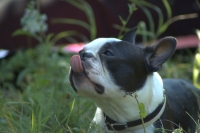 Where Are The Anal Glands?
Where Are The Anal Glands?
Your Boston Terrier’s anal glands are two small glands (or sacs) that are located on either side of his anus.
Purpose Of The Anal Glands
This is going to sound weird — but the purpose of the anal glands is for pheromone secretion to the outside of the stool.
When your Boston Terrier secretes pheromones he is marking his territory, which is more important for wild, roaming animals, not your sweet little house-pet.
Anyways, most dogs empty these glands by themselves when they go “number 2” or during exercise. But some dogs anal glands become impacted and they need assistance.
Causes of Impacted Anal Glands
• Not getting enough fiber
• Obesity
• Lack of exercise
Symptoms of Impacted Anal Glands
If your dog has failed to empty his anal gland he may rub his tooshy on the ground (this is called “scooting”). This helps dogs squeeze the glands together, and ultimately empty them out.
If your Boston Terrier is still not able to successfully empty his anal gland – he may show signs of discomfort, and begin licking/biting the anal area or strain when going “number 2.”
If this problem is not treated right away your dog may develop a rash or irritation around the anus.
So, if your dog exhibits signs of an impacted anal gland, take him to the vet … your vet should be able to resolve the problem and prevent possible complications.
If your dog is constantly developing impacted anal glands you should have your vet examine him to make sure another medical condition isn’t causing the problem.
Dogs may rub and lick their rectal area because they are suffering from allergies, intestinal parasites, or tumors.
The number one cause for anal gland problems is due to an infection called anal saculitis, which requires antibiotics to clear the infection.
Treatment For Impacted Anal Glands
If you and your vet have looked at all possible medical causes for your dog’s impacted anal glands and aren’t able to stop it from occurring, you may want to consider surgery.
In rare cases of anal gland surgery, loss of anal sphincter control can occur postoperatively. Talk to your vet before making any decisions, and be sure to discuss all treatment options.



